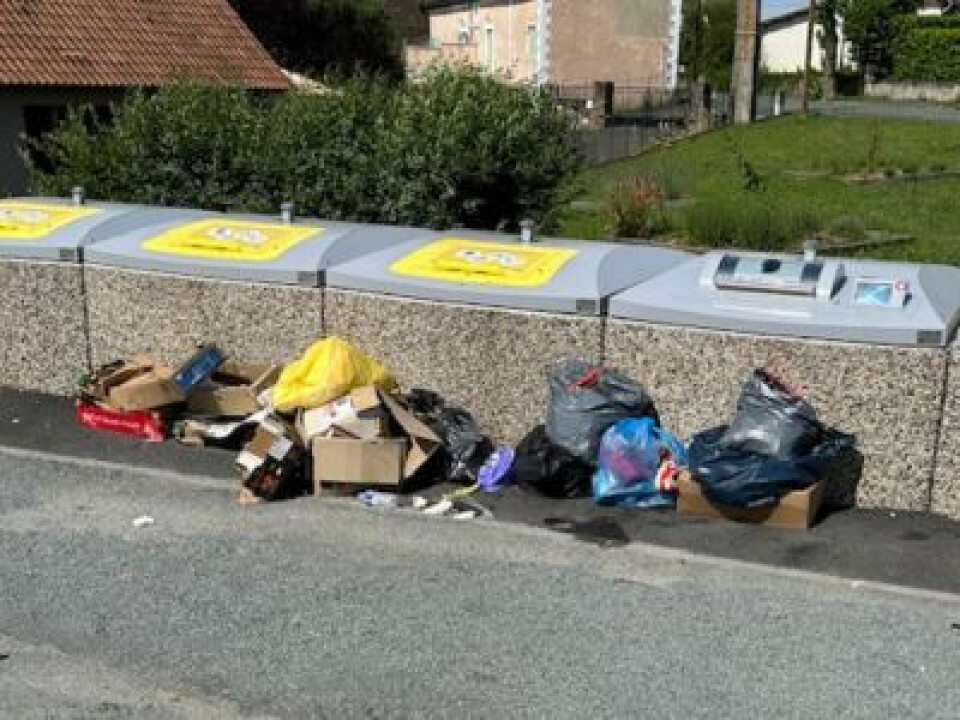-
France’s end-of-year tips: how much to give firefighters, cleaners, and waste collectors
Informal tips known as ‘étrennes’ are widespread practice
-
‘A legend of the century’, ‘incredibly French’: tributes paid to Brigitte Bardot
The former actress and animal rights activist died on December 28 at the age of 91
-
January 1 easyJet strike: French union calls for ‘zero take-offs’
Minority cabin crew union calls for one-day walkout over scheduling issues
Dordogne residents ready for court battle over ‘incentive’ bin charges
The new rubbish collection fees do not convince people to reduce waste but do increase fly tipping, say campaigners

Residents are going to court to challenge an unpopular ‘incentive’ rubbish collection charge that they claim has doubled the average household bill and been ineffective.
It has led to many people just dumping bags outside the collective bins, they say.
The Dordogne group is also banding together with 40 other affected areas around France to discuss strategies.
Three or four-fold increase in fly tipping
Official eco agency Ademe has released reports claiming that such schemes – with a variable fee for waste collection depending on how much is put out – have reduced ordinary household waste for collection by 30% and have boosted recycling in the same areas by an average of 28%.
It said that where ‘incentive’ schemes were introduced, the most common and effective included a charge per bin and, to work well, this had to be €3 or more.
Read more: Bin collection fees in France: what changes do you need to know about?
France has a target of 25 million taxpayers to be on ‘incentive’ schemes by 2025 but at present only seven million are affected.
Ademe admits that in areas that introduced incentive charges there had been a three or four-fold increase in fly tipping, of which 70% involved bags dumped near official collection points.
It insisted, however, that benefits in terms of reduced volumes of ‘grey’ bin waste outweighed the problem of dumped bags.

Photo: Reader Kim Comber sent this photo, saying it has become a ‘familiar sight’ in Dordogne; Credit: Kim Comber
Legal action from residents’ group
So far, areas using incentive charges have been mostly in the rural east and west.
Several readers have told of their negative experiences.
Florence Poumarède, of the AMCODD association for dissatisfied Dordogne residents, reported this month that they were about to lodge legal action with the Tribunal administratif de Bordeaux, to attack the incentive fee.
They are also awaiting a judgement by the court in a separate case attacking the linked change to a system called PAV, whereby residents take their rubbish bags to sites with large communal bins that open with a swipe of a card.
“It is not right that we are paying a lot more for a service we are not getting – we have to do the work ourselves, in some cases driving several kilometres.
“Most people have found they are paying nearly twice as much,” Ms Poumarède said.
Door-to-door collection has continued for some elderly or ill residents and some areas not yet equipped with PAV.
Read more: Stroke victim in Dordogne faces €2,000 a year waste collection bill
What is an incentive-based charge?
To cover the cost of waste collection, homeowners in France pay a taxe or redevance d’enlèvement des ordures ménagères (TEOM or REOM).
TEOM, where used, is shown on the same bill as taxe foncière homeowners’ tax, REOM is billed separately.
TEOM is based on half the theoretical annual rental value of the property, to which a percentage rate fixed by the council is applied.
The calculation of REOM is often linked to the number of people in the household.
Either may, if the local council or group of councils decides, combine a fixed part of the bill and a variable ‘incentive-based’ part, linked to factors such as the size of the household’s bin, how many bins it puts out per year, or the weight of the waste.
Last year, Dordogne moved from a traditional TEOM to a redevance, with a fixed part based on household size and an ‘incentive’ part for additional deposits after an allowance.
For example, in PAV areas, a couple pay €259/year, which allows for 26 collective bin openings, accepting 60 litres of rubbish – two small bin bags – each time, after which each opening costs €5.58.
In door-to-door collection areas, a couple pay €362.59, with 13 removals of a 120-litre grey bin, after which it costs €11.16 for each extra bin.
Read more: France considers €3 per bin collection charge
Second-home owners are charged the same
Ms Poumarède said: “The charge is not an ‘incentive’, it is a punishment. And even if you lower the volume and do more recycling, you are still obliged to pay, like those that make no effort.”
She said that “in the countryside, people with hens and dogs, etc, find they do not need as many ‘openings’ a year as they are allocated”.
Second-home owners in the area are charged the same as a two-person household, which has also led to many feeling dissatisfied as they do not need 26 deposits a year.
Ms Poumarède understands from discussions with the local waste department that it calculates the weight of waste based on what is collected in the official systems and that Ademe has not accounted for the weight of the inappropriately dumped bags.
In addition, she said, official containers often malfunction and do not open so it is understandable if some people give up. She had not noticed a rise in dumping in natural areas away from bin sites.
Her association has 1,500 members and 15,000 Facebook page supporters. This month, its leaders will meet in Toulouse with around 40 similar groups from other parts of France to discuss strategies.
A group of communes near Toulouse has won a court order to return to door-to-door collections, she said.
Reader Judith Lee, from Dordogne, said: “In our department, with all the tourist accommodation, fly tipping in summer has become horrendous, not to mention hazardous.”
Has your area brought in a rubbish incentive fee? Tell us how it is working out via news@connexionfrance.com
Related articles
‘Pay per wheelie bin’ rubbish charge set to expand across France
Is home composting now mandatory in France?
French property taxes set to rise: when will you know the amount?
























